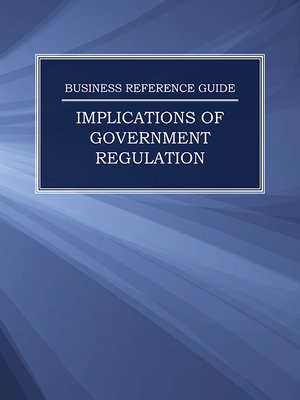
Sign up to save your library
With an OverDrive account, you can save your favorite libraries for at-a-glance information about availability. Find out more about OverDrive accounts.
Find this title in Libby, the library reading app by OverDrive.



Search for a digital library with this title
Title found at these libraries:
| Library Name | Distance |
|---|---|
| Loading... |
This volume begins with an essay by Seth M. Azria that analyzes the effects of antitrust legislation. These laws help
encourage competition within the economy by protecting consumers and spurring innovation while at the same time
limiting excessive market power, tying agreements, and cartel violations. Azria also provides information on some
of the penalties faced by antitrust law violators before Heather Newton explores government regulation in the financial
services industry. Serving as the basis for modern finance institutions are the Sarbanes-Oxley Act of 2002, the
Glass-Steagall Act, and the Gramm-Leach-Bliley Act. Newton includes a summary of each of these before offering
an overview of the primary financial industry overseers, such as the Securities and Exchange Commission and the
Federal Deposit Insurance Corporation. Michael P. Auerbach develops Newton’s summary on the aforementioned
Sarbanes-Oxley Act by discussing the bankruptcy of Enron and the other events that led to the regulation act’s passage.
The wide-sweeping implications the act had on corporate accounting practices in the United States are also discussed.
Marie Gould expands some on Auerbach’s Sarbanes-Oxley Act analysis before discussing corporate risk assessment
guidelines and regulations and how organizations adhere to these them.







